Understanding Integrative Care for Mental Health
Integrative care represents a transformative approach to mental health treatment, combining traditional medical interventions with complementary therapies to address the whole person—mind, body, and spirit. As mental health challenges commonly coexist with chronic physical conditions, an integrative, collaborative care model offers a comprehensive framework to improve outcomes, reduce costs, and enhance patient satisfaction. This guide explores foundational principles, evidence-based models, therapeutic modalities, practical guidelines, and illustrative case studies, serving as a resource for healthcare practitioners aiming to implement or refine integrative mental health services.
Foundational Principles and Frameworks of Integrative Mental Health Care
What are the fundamental principles and frameworks of supporting mental health through integrative care?
Supporting mental health through integrative care is based on a set of fundamental principles that focus on treating the whole person. This approach recognizes that mental health is interconnected with physical health, lifestyle, and social factors. It emphasizes a holistic understanding of each individual, viewing them as whole systems rather than just collections of symptoms.
A key element of this framework is the collaboration among diverse healthcare providers. Multidisciplinary teamwork involves psychiatrists, primary care physicians, nutritionists, therapists, acupuncturists, and other specialists working together to develop coordinated treatment plans. Shared decision-making with patients is central, empowering individuals to be active participants in their care.
Evidence-based complementary therapies play a vital role. These include mind-body techniques like yoga, meditation, and mindfulness, as well as nutritional interventions such as omega-3 fatty acids, vitamins, and herbal medicine. These modalities are incorporated according to each person’s unique needs and preferences.
Personalized, stepwise care ensures interventions are tailored and adaptable. Starting with the least invasive strategies, care can progress to more intensive treatments based on patient response and evolving goals. This model emphasizes continuous assessment and adjustment.
The spectrum of care in integrative mental health spans from prevention to treatment. Early identification and lifestyle modifications aim to bolster resilience, while specialized therapies target existing conditions. This continuum supports sustained well-being by addressing root causes and fostering long-term resilience.
Overall, the frameworks maximize therapeutic potential by blending conventional medicine with complementary practices. They promote an individualized, balanced approach to mental health support, aiming to enhance effectiveness, reduce side effects, and nurture the innate healing capacities of each person.
Models and Strategies for Behavioral Health Integration in Primary Care
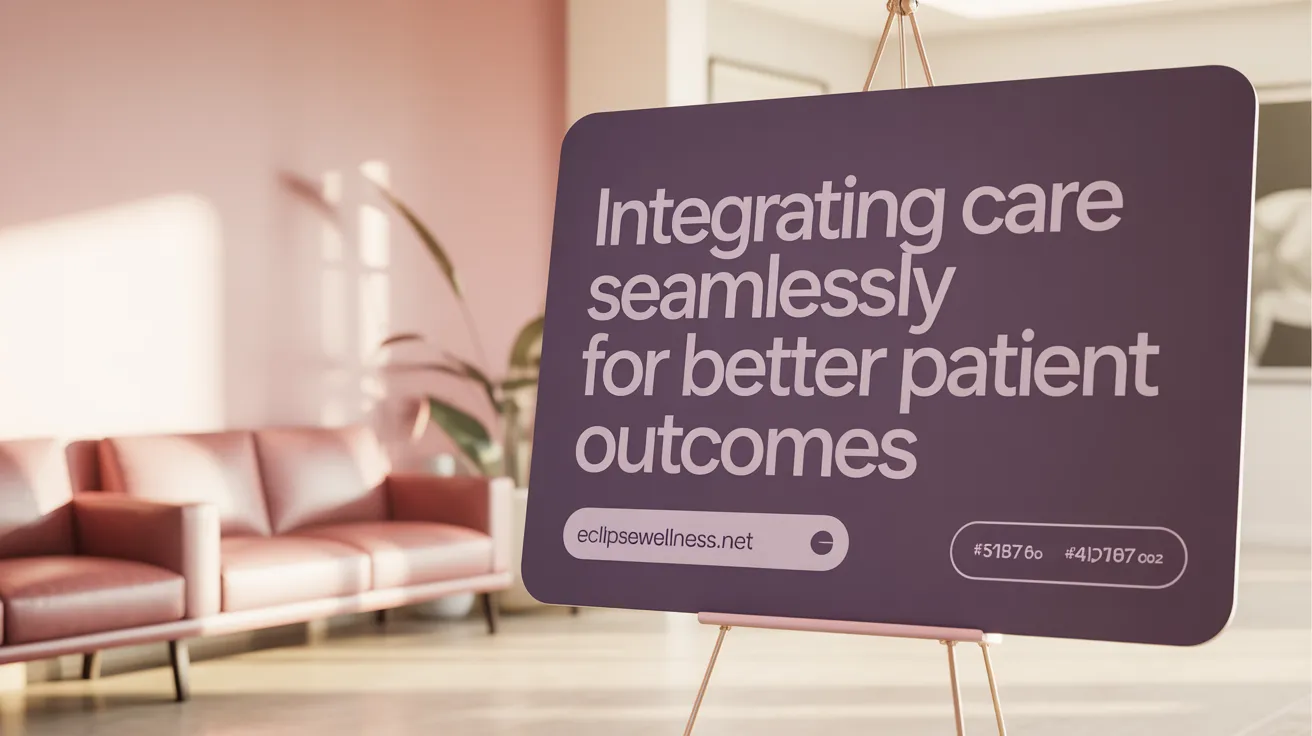
What models and strategies exist for integrating behavioral health into primary care settings?
Several proven models facilitate effective integration of behavioral health services within primary care environments. The most notable among these are the Collaborative Care Model (CoCM), the Primary Care Behavioral Health (PCBH) model, and team-based approaches like the GATHER model. Each emphasizes collaborative teamwork, shared workflows, and active involvement of behavioral health specialists such as psychologists, social workers, or psychiatric consultants.
The Collaborative Care Model is supported by extensive research demonstrating improvements in mental health outcomes, reductions in healthcare costs, and increased patient satisfaction. It involves a multidisciplinary team led by a care manager, with psychiatric consultation and regular patient monitoring. This model ensures systematic identification, treatment, and follow-up of mental health conditions within primary care.
The Primary Care Behavioral Health (PCBH) Model embeds behavioral health practitioners directly into primary care clinics, enabling swift access to assessment and brief interventions. These providers work closely with primary care physicians to address mental health, substance use, and social issues, emphasizing a patient-centered, accessible approach.
Strategies that support successful integration include the routine use of screening tools like the PHQ-9 for depression or GAD-7 for anxiety to facilitate early detection. Care managers coordinate treatments, follow-ups, and referrals, acting as vital links within the team. Additionally, leveraging electronic health records (EHRs) enhances communication, data sharing, and continuous care.
Implementation success depends on overcoming barriers such as inconsistent reimbursement policies and workforce shortages. Solutions include adopting value-based payment models that incentivize integrated care, and employing flexible staffing strategies like telehealth or community health workers.
Organizations like the Agency for Healthcare Research and Quality (AHRQ) and the Collaborative Family Healthcare Association provide resources, guidelines, and training programs to support providers in establishing and sustaining these models.
In diverse settings, especially rural or culturally diverse populations, tailoring the approach to local needs and ensuring effective information sharing are essential for maximizing impact. These models not only improve access and outcomes but also foster a holistic approach to patient well-being that addresses both physical and mental health comprehensively.
Evidence Supporting Integrative Mental Health Approaches
Numerous clinical trials and meta-analyses highlight the effectiveness of integrative mental health strategies. These studies consistently show improved outcomes when combining conventional treatments with complementary modalities like lifestyle interventions, nutraceuticals, and mind-body therapies.
Research indicates that implementing models such as Collaborative Care Management (CoCM) significantly enhances mental health treatment results. For example, patients with depression, anxiety, or PTSD who receive integrated care often experience greater symptom reduction and higher satisfaction compared to those receiving standard treatment alone.
The benefits extend beyond symptom management. Evidence demonstrates that integrative approaches reduce healthcare utilization by decreasing hospitalizations, emergency visits, and ongoing medication use. This cost-efficiency translates into savings for healthcare systems while improving overall patient health.
Large-scale initiatives, including Project IMPACT and programs within the Veterans Health Administration, exemplify successful deployment. These projects have shown that integrated care models foster higher adherence to treatment guidelines, lead to better physical and mental health outcomes, and lower overall costs.
Patient-centered and holistic, these models also contribute to destigmatizing mental health care. Patients report increased satisfaction, feeling more empowered and engaged in their recovery.
In summary, the consistent, robust evidence underscores that integrating behavioral health services into medical care enhances outcomes, reduces costs, and improves patient experiences. This solid foundation advocates for broader adoption of such approaches to meet the complex needs of individuals with co-occurring physical and mental health conditions.
Collaborative Care Models: Structure and Implementation
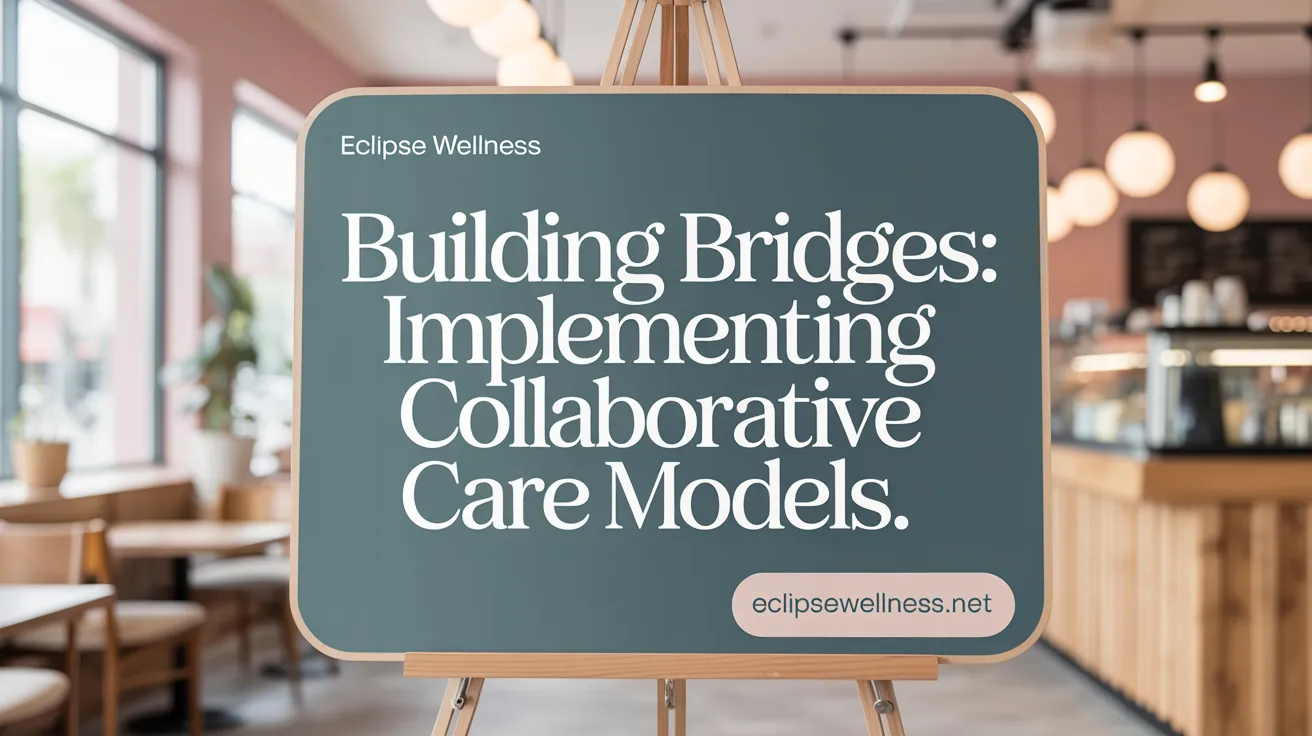
What are collaborative care models in mental health, and how are they implemented?
Collaborative care models (CoCM) are structured, evidence-based approaches designed to improve mental health treatment within primary care settings. These models promote a team-based approach involving primary care providers, mental health professionals, care managers, and often psychiatric consultants. The primary goal is to offer comprehensive, patient-centered care that seamlessly integrates mental health services into routine healthcare.
The implementation of CoCM involves several critical components. Systematic processes such as regular communication among team members are essential for maintaining coordinated care. Shared care plans are developed, allowing for transparent treatment goals and responsibilities. Routine screening tools like PHQ-9 for depression or GAD-7 for anxiety are used systematically to identify patients needing support.
Measurement-based care is a cornerstone of CoCM, involving ongoing tracking of symptom severity to inform treatment adjustments. Population management strategies, such as patient registries, support providers in monitoring progress across large caseloads and ensuring no patient falls through the cracks. The team collaborates frequently through case reviews and consultations, applying brief, evidence-based psychotherapies alongside medication management.
Factors crucial for successful implementation include dedicated staff training, organizational stability, and fostering a culture of open communication. Acceptance and buy-in from all healthcare team members enhance coordination and effectiveness. Technology plays a significant role, with electronic health records facilitating information sharing.
The benefits of well-implemented CoCM are substantial. These include increased access to mental health care, better treatment outcomes, higher patient satisfaction, and reduced healthcare costs due to fewer emergency visits and hospitalizations. The model is adaptable across diverse populations and healthcare settings, helping bridge gaps in mental health services.
Overall, integrating collaborative care models in mental health involves a strategic blend of multidisciplinary teamwork, continuous monitoring, and organizational support to deliver more effective and accessible mental health services.
Guidelines and Best Practices for Healthcare Providers Implementing Integrative Care
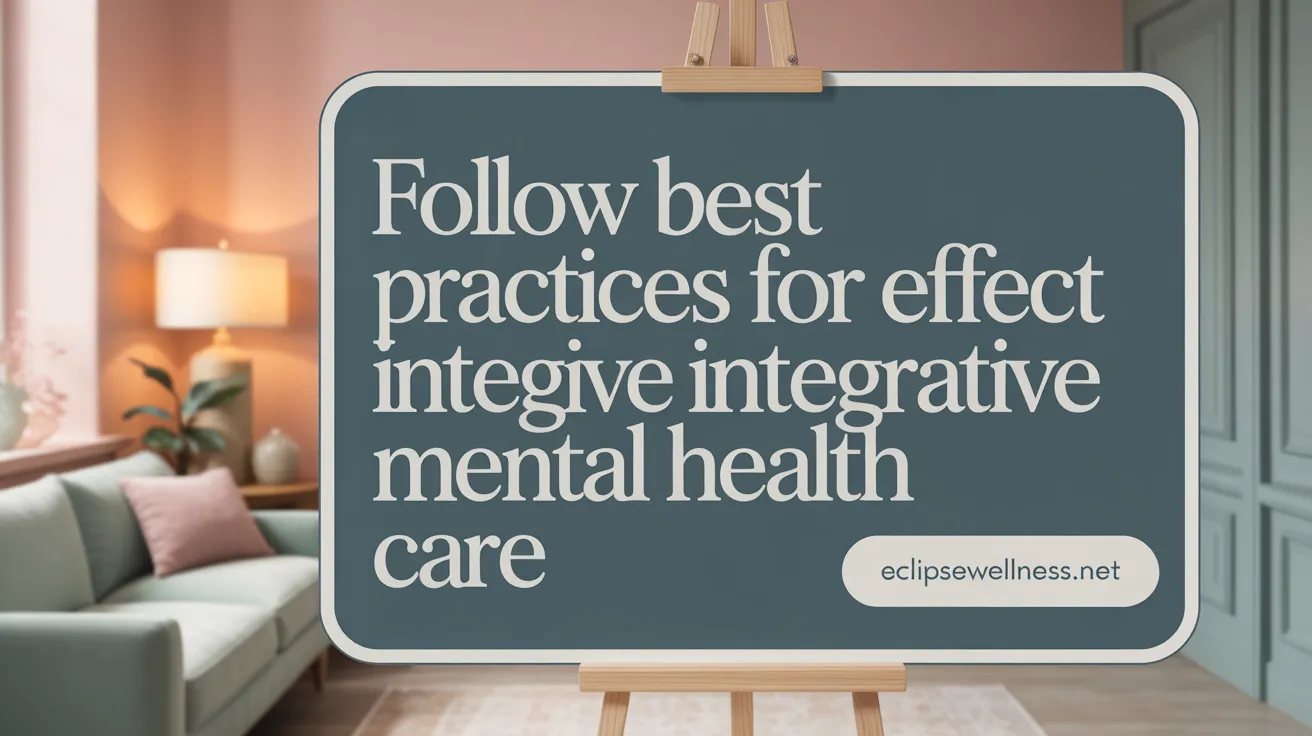
What guidelines and best practices should healthcare providers follow to implement integrative care for mental health?
Implementing effective integrative mental health care requires adherence to established, evidence-based practices. Healthcare providers should prioritize routine screening for mental health conditions using validated assessment tools like PHQ-9 for depression and GAD-7 for anxiety. Early identification allows timely intervention and better management.
Developing clear referral pathways is essential. When a patient requires specialized treatment, seamless connections to mental health professionals or advanced care settings must be in place. Integrative models like the Primary Care Behavioral Health (PCBH) and the Collaborative Care Model (CoCM) offer frameworks that promote teamwork and coordinated services.
An essential component of successful implementation is establishing a diverse multidisciplinary team. This team can include psychologists, psychiatrists, social workers, nurses, nutritionists, and other health practitioners, ensuring comprehensive care tailored to individual needs.
Continuous provider education and training are vital. Ongoing learning about holistic, patient-centered approaches, cultural competence, and current evidence in integrative therapies help providers deliver safe, effective, and personalized care.
Additionally, fostering strong patient engagement and cultural sensitivity improves adherence and satisfaction. Tailoring interventions to respect patients' beliefs and preferences enhances the overall care experience.
Aligning these practices with the Quadruple Aim—enhancing patient experience, improving population health, reducing costs, and supporting care team well-being—can significantly optimize outcomes. By integrating behavioral health into primary care using these guidelines, healthcare systems can achieve more holistic, effective, and sustainable mental health services.
Therapies and Treatments in Integrative Mental Health Care
What roles do various therapies and treatments play in supporting mental health within an integrative care framework?
In an integrative care approach, a variety of therapies and treatments work together to promote mental well-being. Conventional psychotherapies, such as cognitive-behavioral therapy (CBT), dialectical behavior therapy (DBT), and acceptance and commitment therapy (ACT), form the foundation for addressing emotional and behavioral issues. Alongside these, medication management may be used to stabilize symptoms when needed.
Beyond traditional treatments, lifestyle medicine emphasizes the importance of diet, physical activity, and sleep hygiene. Healthy eating habits, regular exercise, and proper sleep are crucial for supporting brain health and emotional resilience. Nutraceuticals, such as omega-3 fatty acids, vitamins (like D and B-complex), and plant medicines or herbs, are incorporated to enhance physical health and mental functioning.
Mind-body therapies, including yoga, meditation, tai chi, and mindfulness practices, offer additional tools for reducing stress, improving mood, and fostering a sense of calm. These practices help integrate the mind and body, addressing the spiritual and emotional dimensions of mental health.
Clinicians, especially psychiatrists and mental health professionals, play a vital role in evaluating the scientific evidence for these treatments. They guide patients in the safe use of natural remedies, considering potential interactions with medications and individual health conditions.
An important aspect of this approach is delivering personalized, prevention-focused care. Treatment plans are tailored to each individual's unique needs, preferences, and risks. This holistic strategy emphasizes early intervention and addressing root causes of mental health issues to achieve sustainable wellness.
Overall, integrating these diverse therapies facilitates comprehensive care. This model not only aims to alleviate symptoms but also promotes resilience, long-term health, and improved quality of life for those experiencing mental health challenges.
Addressing Comorbidities Through Integrative Collaborative Care
How Common Are Mental and Physical Health Comorbidities?
Many individuals with mental health conditions also face physical illnesses. Disorders like depression and anxiety frequently coexist with chronic diseases such as heart disease, diabetes, arthritis, and Alzheimer’s. This overlap complicates treatment and highlights the need for a holistic approach.
What Are the Challenges of Conventional Treatments?
Traditional mental health treatments often focus mainly on medication and psychotherapy. However, these approaches may result in partial symptom relief and adverse side effects. Managing physical comorbidities requires additional strategies that are often not included in standard care.
How Does the Integrative Approach Incorporate Different Modalities?
An integrative collaborative care model combines conventional treatments with lifestyle interventions, nutraceuticals (like omega-3s and vitamins), and mind-body therapies such as yoga, tai chi, and meditation. These complementary therapies address the whole person—mind, body, and spirit—improving overall health.
What Roles Do the Multidisciplinary Team Play?
Effective care involves a team of diverse specialists: psychiatrists, primary care providers, nutritionists, acupuncturists, behavioral health coaches, and peer support advocates. Teamwork and clear communication ensure coordinated treatment, avoiding fragmented care.
How Is Personalized, Shared Decision-Making Achieved?
Care plans are tailored based on thorough assessments, including lifestyle history and patient preferences. Regular reviews and adjustments are made collaboratively, empowering patients and ensuring interventions fit their unique needs.
What Are the Benefits for Complex Patients?
This approach improves symptom management, enhances physical health outcomes, reduces hospitalization rates, and boosts patient satisfaction. It especially benefits those with numerous health issues, promoting resilience and long-term well-being.
| Aspect | Description | Additional Info |
|---|---|---|
| Comorbidity Prevalence | High in mental and physical health conditions | Affects treatment complexity |
| Conventional Limitations | Partial response, side effects | Need for additional strategies |
| Modalities Integrated | Lifestyle, nutraceuticals, mind-body | Addresses whole health |
| Team Roles | Multidisciplinary, collaborative | Improves coordination |
| Personalized Planning | Based on assessments and preferences | Ensures tailored care |
| Patient Outcomes | Better symptom control, lower costs | Long-term resilience |
By combining these elements, integrative collaborative care offers a comprehensive pathway to better health outcomes for individuals facing complex mental and physical health challenges.
Overcoming Challenges and Enhancing Access in Integrative Mental Health Care
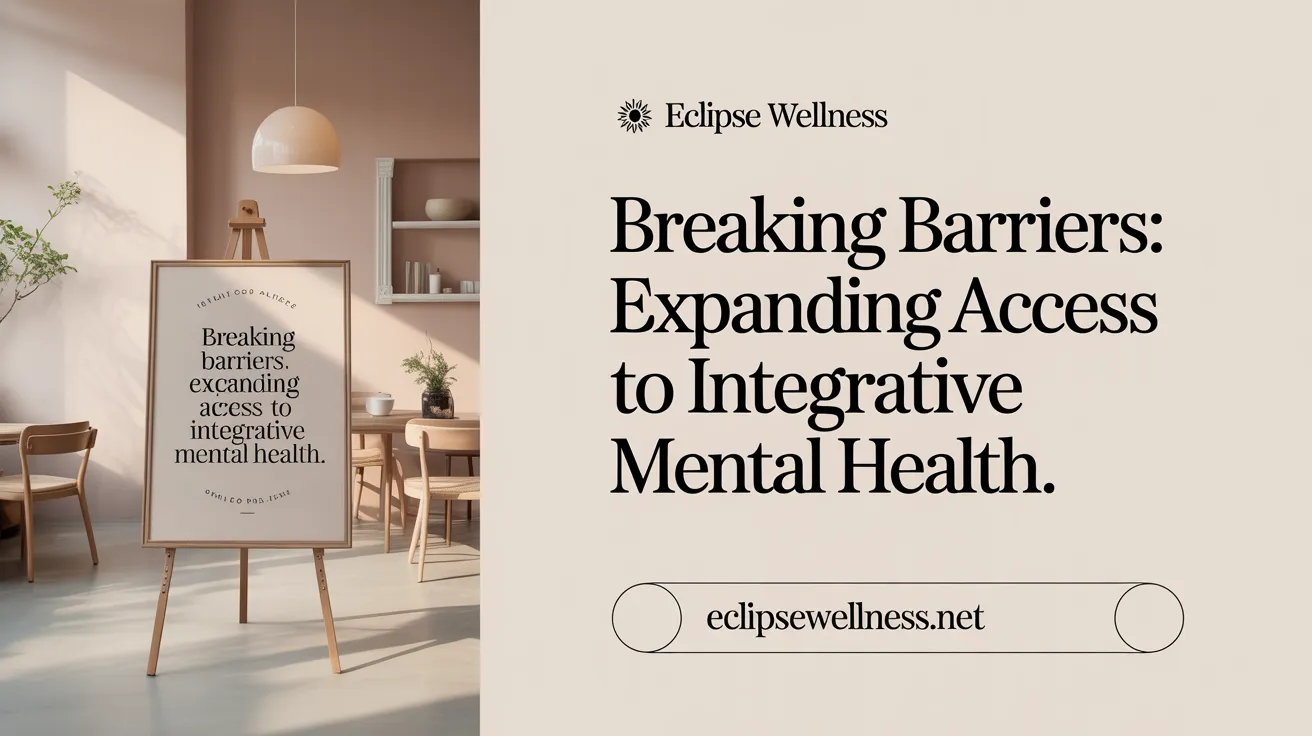
Insurance coverage and reimbursement issues
One of the significant hurdles in adopting integrative mental health care is inconsistent insurance coverage. Many reimbursement policies favor conventional treatments, leaving adjunctive therapies like nutraceuticals, mind-body practices, and lifestyle interventions underfunded or outright unsupported. As a result, patients often face out-of-pocket costs, limiting access to comprehensive care.
Provider shortages and training gaps
There is a notable shortage of trained professionals in integrative approaches, including specialists proficient in nutrition, mind-body therapies, and integrative medicine. Additionally, many primary care providers lack training in these modalities, which hampers implementation. Expanding educational programs and continuing professional development in integrative care can address these gaps.
Data sharing and coordination barriers
Effective integrative care relies on seamless communication among diverse healthcare providers. However, data sharing across different systems and disciplines often faces technical and privacy challenges. Enhancing interoperable health information systems and establishing clear data-sharing protocols are crucial for coordinated treatment.
Geographic disparities and stigma
Access to integrative mental health services varies greatly depending on geographic location. Rural and underserved areas often lack specialized providers, and stigma surrounding mental health still deters many from seeking care. Mobile clinics, telehealth, and community outreach programs can help bridge these gaps.
Telehealth and community partnerships
Adopting telehealth platforms expands access, especially in remote areas. Telehealth also facilitates multidisciplinary collaboration and ongoing monitoring. Partnering with community organizations helps in outreach, education, and providing culturally sensitive services that resonate with local populations.
Peer support and innovative care models
Peer support programs empower individuals with lived experience, fostering engagement and resilience. Innovative models such as the Collaborative Care Model and Hub-and-Spoke arrangements promote integrated, patient-centered approaches. These strategies enhance trust, reduce stigma, and improve overall treatment outcomes.
| Challenge | Proposed Solution | Impact | Additional Details |
|---|---|---|---|
| Insurance restrictions | Advocate for policy change; expand coverage | Increased access | Support from professional bodies and patient advocates can influence policy updates |
| Provider training shortages | Implement targeted education programs | Better care delivery | Certification and continuing education in integrative methods |
| Data sharing issues | Develop interoperable systems | Improved coordination | Use of secure, standardized health IT solutions |
| Geographic gaps | Use telehealth; establish local partnerships | Broader reach | Mobile clinics and community health workers |
| Stigma and access | Community education; outreach | Greater engagement | Culturally relevant education campaigns |
| Service delivery models | Expand peer support; innovative care models | Enhanced outcomes | Emphasis on patient-centered, holistic approaches |
Efforts to address these barriers are essential for realizing the full potential of integrative mental health care. Combining policy changes, workforce development, technological advancements, and community engagement can significantly improve access and quality of services for diverse populations.
Illustrative Case Studies of Successful Integrative Mental Health Initiatives
Are there notable case studies or examples demonstrating successful integrative mental health initiatives?
Absolutely. Several real-world examples highlight how integrated mental health approaches can significantly improve patient outcomes.
In California, the Integrated Behavioral Health Project (IBHP) demonstrated success by integrating physical and mental health services within community clinics. Evaluations showed marked improvements not only in mental health symptoms but also in physical health measures, such as blood pressure and glucose control. The program utilized a multidisciplinary team, including primary care providers, mental health specialists, and care managers, to deliver coordinated care tailored to individual needs.
Massachusetts's Child Psychiatry Access Project (MCPAP) is a standout model for pediatric mental health. It provided primary care providers with quick access to psychiatric consultations, training, and resources. This collaborative setup resulted in a 57% increase in treatment success rates among children and adolescents with psychiatric conditions. It also reduced wait times for specialized care and empowered primary care clinicians to manage conditions more confidently.
The IMPACT (Improving Mood-Promoting Access to Collaborative Treatment) program in Washington State focused on depression care within primary care settings. Research indicated that team-based, proactive depression management was more than twice as effective as usual care. Patients experienced better symptom relief, higher satisfaction, and improved quality of life. Importantly, the program lowered overall healthcare costs by reducing emergency visits and inpatient stays.
Internationally, countries like the UK, Vietnam, Israel, and Nigeria have adopted innovative frameworks such as EPIS (Exploration, Preparation, Implementation, Sustainment). These frameworks guide districts and healthcare providers in systematically implementing integrated care models, addressing local cultural, economic, and health system factors. For example, in Vietnam, community-based mental health services incorporated traditional healing practices alongside Western medicine, leading to increased community acceptance and improved management of common mental disorders.
Lessons Learned from Successful Initiatives
- Multidisciplinary Collaboration: Engaging diverse healthcare providers enhances comprehensive care.
- Personalized, Stepwise Approaches: Tailoring interventions to individual circumstances facilitates better engagement and outcomes.
- Use of Frameworks like EPIS: Structured implementation models support sustainability and adaptability.
- Data-Driven Evaluation: Regular assessment and feedback improve program effectiveness.
These case studies exemplify how integrating mental health into broader healthcare systems benefits patient well-being, reduces stigma, and promotes cost-effective, sustainable care models.
Educating Healthcare Practitioners on Integrative Mental Health Strategies
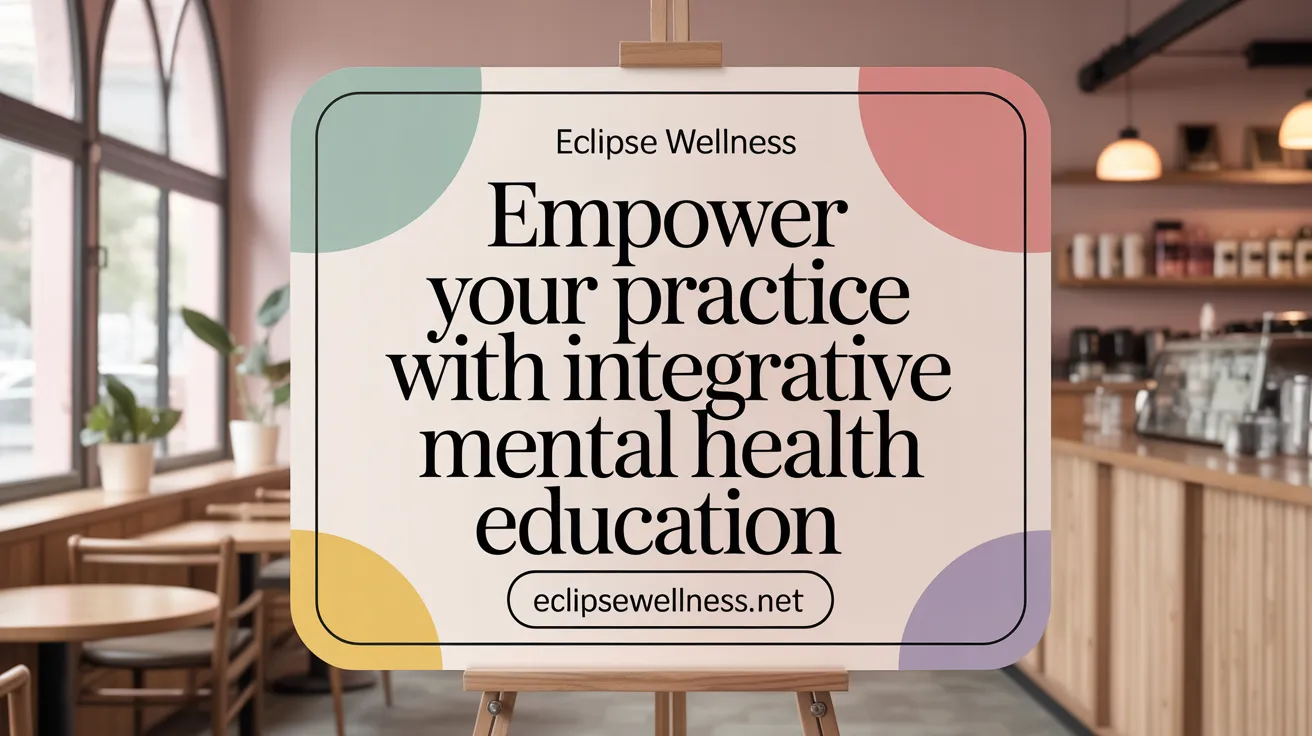
How can healthcare practitioners be effectively educated on the application of integrative mental health strategies?
Effective education for healthcare practitioners starts with comprehensive curricula that blend conventional and holistic approaches. These curricula should incorporate experiential learning methods, such as simulation exercises, clinical placements, and problem-based learning modules. These active learning strategies allow clinicians to practice applying integrative techniques in real-world scenarios, enhancing their confidence and competence.
Interprofessional collaboration is crucial. Training programs that involve mental health specialists, primary care providers, educators, and policymakers help foster teamwork and understanding across disciplines. This approach not only improves coordination but also ensures that interventions are culturally sensitive and tailored to specific populations.
Embedding mental health literacy and anti-stigma programs within training helps future providers recognize and address biases, creating a more welcoming environment for diverse patient groups. Practical skills such as relational competence—building trust and effective communication—as well as patient engagement techniques, are vital components incorporated into ongoing education.
Addressing barriers to implementation, such as societal stigma and curriculum limitations, requires institutional commitment to standardizing evidence-based, culturally appropriate training frameworks. These frameworks should emphasize continuous professional development, encouraging practitioners to stay current with emerging research and innovative practices.
Methods to support lifelong learning include reflective journaling, community-based service experiences, and participation in workshops or online courses. These strategies foster personal growth, empathy, and skill development, equipping healthcare providers to deliver holistic, patient-centered care.
By prioritizing structured, interdisciplinary, and culturally sensitive education, healthcare systems can ensure practitioners are well-prepared to implement effective integrative mental health strategies. This comprehensive approach enhances clinical outcomes, patient satisfaction, and overall mental health resilience.
Moving Forward: Embracing Comprehensive Integrative Mental Health Care
Integrative care is redefining mental health treatment by weaving together conventional medicine with complementary therapies in a patient-centered, collaborative framework. By addressing the complex interplay between mental and physical health, and by involving diverse care teams empowered through evidence-based guidelines, this approach offers improved outcomes, greater access, and enhanced satisfaction for patients and providers alike. The compelling evidence, proven models, and practical tools highlighted in this guide provide a roadmap for healthcare systems committed to holistic healing and resilience. Continued education, innovative partnerships, and overcoming systemic barriers remain vital to fully realizing integrative care's potential. Ultimately, embracing this comprehensive framework promises a future where mental health support is accessible, effective, and tailored to the whole person.
References
- An integrative collaborative care model for people with ...
- INTEGRATED CARE QUICK GUIDE:
- The Integration Center: Holistic Mental Health Guide
- Understanding integrated behavioral health care and the ...
- Integrated Behavioral Health: An Introductory Guide for ...
- Integrative mental health care: A therapist's handbook.
- Integrated behavioral health treatments: innovations to ...
